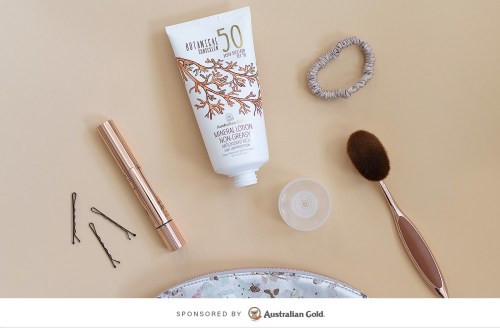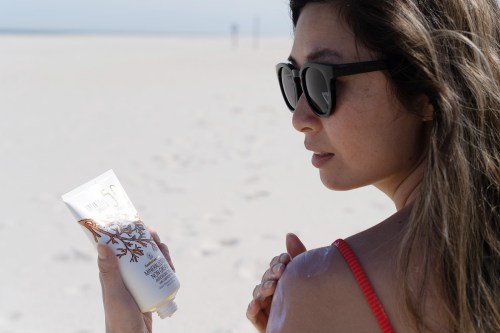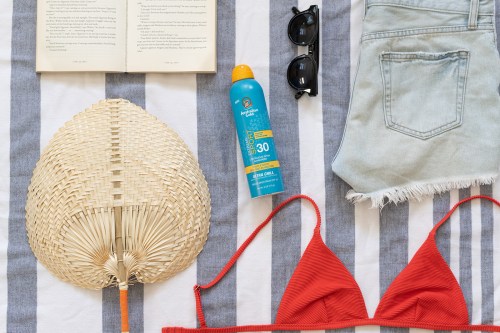advertisement
Finally: The Answer to Every SPF Question You’ve Ever Had, Straight From a Sun-Care Expert
This sun-care expert takes you through what SPF is best for sun protection, as well as answers the rest of your most common SPF questions.

From figuring out what SPF is best for sun protection to differentiating between which kind of sunscreen to use (to spray or not to spray?), there’s a lot of info to sift through when it comes to sun care.
Add in conflicting intel (why do some people swear by SPF 100, but others say it’s not worth it?), and it’s no wonder people have questions. That’s why we teamed up with Australian Gold to gather our readers’ SPF FAQs—and according to the results, most of us are on the same page: pretty darn confused.
To shed some light on the sun-care situation and finally get the expert-backed answers we’ve been looking for, we asked Adarsh Vijay Mudgil, MD, and owner of Mudgil Dermatology to give us the lowdown on SPF.
“By far the most common question I get from my patients is what they should be using,” Dr. Mudgil says. “There are many options on the market, which understandably creates additional confusion.” (Cue scary-movie montage of all the times you’ve stared cluelessly at an aisle full of different sunscreen bottles.)
Our readers had the same basic question: What SPF is best for keeping your skin safe from sun damage? Rest assured, Dr. Mudgil answered that Q and more, so keep on scrolling.
Keep reading to find out what SPF is best for protecting your skin—plus, answers to more of your top sun-care questions.

What’s the minimum SPF you can wear to prevent sun damage? And the max?
Numbers are tough even without getting into the nitty gritty of what they mean in regard to protecting your skin, and Dr. Mudgil knows how you feel. “The SPF system is confusing,” he says. “Bottom line, there’s a real difference between SPF 15 and SPF 30, but almost no difference between SPF 30 and SPF 100. So it’s easy to understand why folks are confused.”
According to Dr. Mudgil (and the American Academy of Dermatology, FYI), SPF 30 is the magic number. “As long as it’s SPF 30, that’s all that matters,” he says. “The other important detail is a barrier ingredient like titanium dioxide or zinc oxide, which physically block the sun’s rays.” Hello, double duty protection.
Australian Gold’s Botanical Sunscreen—which comes in body lotions, sprays, and face lotions—contains both titanium dioxide and zinc oxide to ensure skin protection, while leaving you with a powder-like finish (no greasy hands here).
How does SPF level correspond to skin tone?
No matter where you land on the skin-tone spectrum, Dr. Mudgil says that SPF 30 is still the number to go with. (Noticing a pattern yet?) “Where many fail is reapplying every couple of hours,” he says. Even if you have a dark skin tone or have created a solid base tan, you should still reapply every two hours—otherwise you’re at risk for sun damage.
If you use a moisturizer or foundation that already contains SPF, do you need to apply more?
According to Dr. Mudgil, the short answer is yes. “Most foundations usually provide only SPF 15,” he says (aka, not SPF 30). So next time you’re shopping for foundation, search for one that already contains SPF 30, and make a habit of layering sunscreen underneath your makeup, too. More protection is never a bad thing.

Oh, and what about reapplying when you already have makeup on?
Here’s where things get murky: If you’re wearing makeup, how do you reapply every two hours without smearing white lotion all over your polished look? It comes down to getting creative with the type of sunscreen you use. “Using a powder or spray sunscreen works well in this setting,” Dr. Mudgil says. Total game-changer for all your future park and beach days.
Are lotions the best route for all-over sun protection?
No one wants to fall victim to the zig-zag tan lines that are a dead giveaway you used (poorly applied) spray sunscreen, but if you prefer the spray method versus slathering on lotion, you might actually be in luck.
“I find a lotion is great for the initial application, and spray is good for reapplication,” he says. And if you’re looking for a long-lasting, sweat- and water-resistant sunblock, Australian Gold Extreme Sport sunscreens are light, airy, and neutralize odors to keep you feeling fresh all day. Talk about an incentive to reapply.
Now, you can finally take on summer with the confidence you’re getting this whole sunscreen thing right, and when your friends and family inevitably have SPF questions, you’ll be the one with all the answers.
Shop summer SPF essentials

Australian Gold Botanical Sunscreen Starting at $14

Australian Gold Extreme Sport Sunscreen Starting at $9
Sponsored by: Australian Gold
Photos: Tim Gibson for Well+Good
Sign Up for Our Daily Newsletter
Get all the latest in wellness, trends, food, fitness, beauty, and more delivered right to your inbox.
Got it, you've been added to our email list.




